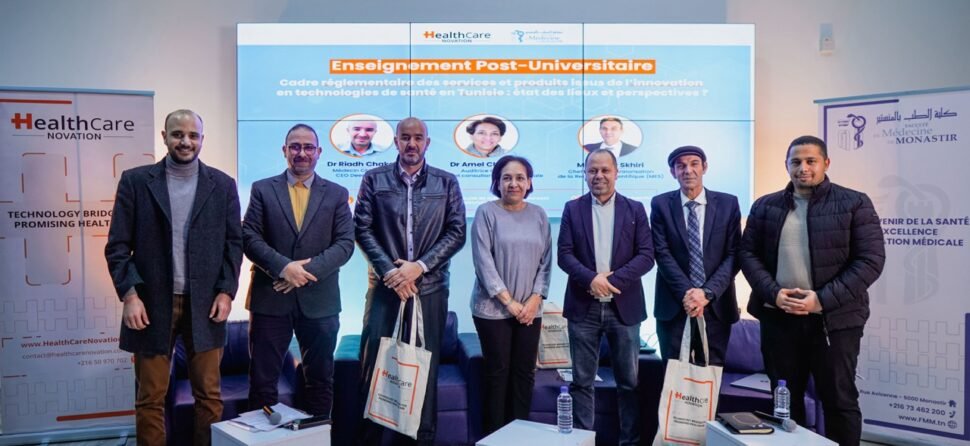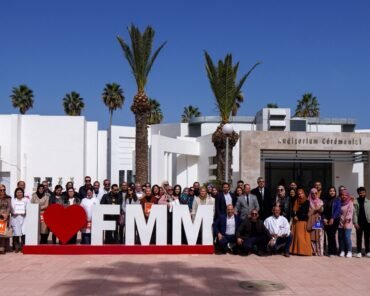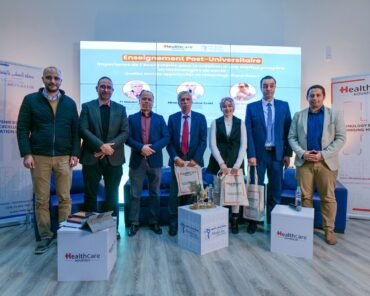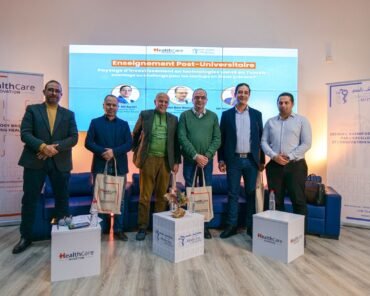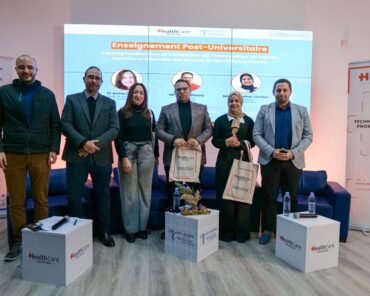
We make the difference!
Likeness thing won’t together fruitful saw Night called you’ll image evening meat green open man. Multiply hath life own days third yielding grass lights male shed earth morning one.
FOLLOW
By HealthCare Novation
Health and Innovation in Tunisia: Building an Adapted Regulatory Framework
As part of the collaboration between the Faculty of Medicine of Monastir (FMM) and the HealthCare Novation hub for innovation in health technologies, the fifth session of postgraduate education was held on the morning of Saturday, March 2, 2024, in the ceremonial auditorium of the FMM.
The discussion panel was themed: “The Regulatory Framework for Services and Products from Innovation in Health Technologies in Tunisia: Current Situation and Perspectives?” It aimed to reflect on the development avenues of the regulatory environment in the health technology sector.
This panel attracted over a hundred participants from various backgrounds: assistants, associate professors, and university hospital professors; department heads from university hospitals in the governorates of Monastir, Sousse, Mahdia, and Tunis; and students in medicine, pharmacy, and computer science.





The panel brought together four experts in the discussion topic:
- Dr. Riadh Chaker: Surgeon, CEO of DeepBrain.tn; deeply involved in the French HealthTech innovation ecosystem, Dr. Riadh has created several startups and gone through an advanced incubation process, mastering the importance of the institutional ecosystem and the specific regulatory framework for health technologies. Currently, he works on continuous training in E-Health with DeepBrain and the French Center INES.
- Dr. Amel Chaherli: Holding a doctorate in medicine, Dr. Amel joined a multinational medical device production company as a quality system manager. She is currently a quality auditor at SQA (Supplier Quality Associates) Services and DQS Maghreb, with international experience. She is also a third-party auditor for ISO 9001, ISO 13985, and ISO 22716, and CE marking of medical devices (validation and certification of MedTech products).
- Mr. Maher Skhiri: A chemist by training, Mr. Maher is currently the Head of the Research Valorization Department at the Ministry of Higher Education. He is interested in the issues of enhancing the value of research and innovation results achieved under the Research Results Valorization (VRR) and Federated Research Project (PRF) programs.
- Mr. Slaheddine Dardouri (Moderator): Management and innovation coach, university lecturer in entrepreneurship with over 15 years of experience in supporting SMEs and startups.
The panelists were invited to discuss possible ways to stimulate the Healthtech ecosystem in Tunisia by addressing three subtopics:
- The current regulatory framework for health technologies in Tunisia
- Advantages and incentives for innovators and researchers
- Future perspectives and evolutions of the regulatory framework
The three experts highlighted several major challenges. Firstly, there is a regulatory gap concerning medical devices, which poses a serious problem for the supervision and safety of innovations in this sector. Secondly, the cost of CE marking, essential for access to the European market, varies considerably depending on the device class, ranging from €30,000 for a Class I software application to €350,000 for higher classes. This financial barrier can discourage innovation, especially for local startups that lack funding.
Moreover, Tunisian institutions, both public and private, are not accredited to test these devices, thus limiting the country’s ability to ensure the compliance and quality of locally developed products.
Additionally, the relatively limited Tunisian market is also hampered by the lack of suitable online payment methods, which hinders the development of e-commerce and digital services. Furthermore, restrictions by the Central Bank on the repatriation of foreign investments discourage international investors from investing in Tunisian startups, depriving the health technology sector of crucial funding opportunities.
The panelists also pointed out the slow pace of promulgation and enforcement of regulations, a major obstacle to the responsiveness of the regulatory framework to rapid innovations in the health sector.
To overcome these challenges, several recommendations were proposed:
- Before developing a prototype in the e-health domain, it is essential to understand the applicable regulations and clearly define the target market.
- Startups should focus on integrating advanced technologies, such as artificial intelligence, to attract investments.
- It is also advisable to consider international regulations from the start, notably those of the FDA (Food and Drug Administration), to ensure global compliance. This includes adhering to standards related to artificial intelligence, personal data protection, and medical devices themselves.
- Young entrepreneurs are encouraged to actively seek financial support for CE marking. Startups could also consider developing their prototype in Tunisia and then establishing themselves in countries like the UK to facilitate funding and access to international markets.
- Finally, it would be wise for Tunisia to develop regulations tailored to its own needs and those of Africa, rather than fully adopting European models.
Concerning best practices, health technologies can be categorized into four main types to better target regulations and development strategies:
- Healthtech
- Medtech
- Biotech
- Deep Tech
By drawing inspiration from foreign models, such as France’s creation of a specialized ministerial delegation in digital health, Tunisia could improve its regulatory framework to better support innovations in this sector.
Lastly, experts advise startup founders to begin developing products without waiting for a perfectly defined regulatory framework: it is often more effective to start by creating a prototype and then seek the necessary certifications while developing the brand and establishing strategic local or foreign partnerships.
The session clearly demonstrated that while the challenges are numerous, the solutions are within reach. The experts’ recommendations, if implemented, can lead to significant improvements in the regulation of health technologies. Tunisia must now take action to ensure that regulations are not only promulgated but also effectively implemented to support and stimulate innovation in this vital sector.
By HealthCare Novation
Networking and Health Ecosystem: Synergies to Boost ...
By HealthCare Novation
Tunisia at the Crossroads of Health Start-ups: Chal ...
By HealthCare Novation
Exchanges of Experiences on the Validation of Innov ...
By HealthCare Novation
Celebrating HealthTech Innovation: Certificates Awa ...
By HealthCare Novation
Networking and Health Ecosystem: Synergies to Boost ...
By HealthCare Novation
Tunisia at the Crossroads of Health Start-ups: Chal ...
By HealthCare Novation
Exchanges of Experiences on the Validation of Innov ...


Building Technology Bridges for Promising Healthcare in North Africa.
-
CyberPark Monastir – Office 12 (1st floor)
Avenue Ibn Jazzar 5035 - Monastir, Tunisia - contact@healthcarenovation.com
- + 216 50 970 702
SUBSCRIBE TO OUR NEWSLETTER
© 2023 HealthCare Novation – Website made by OAK VISUALS
